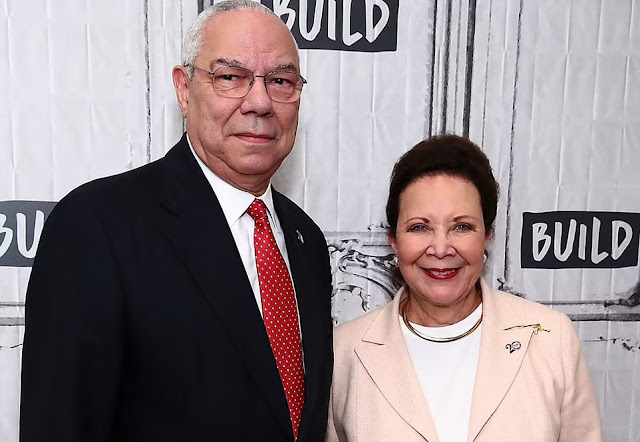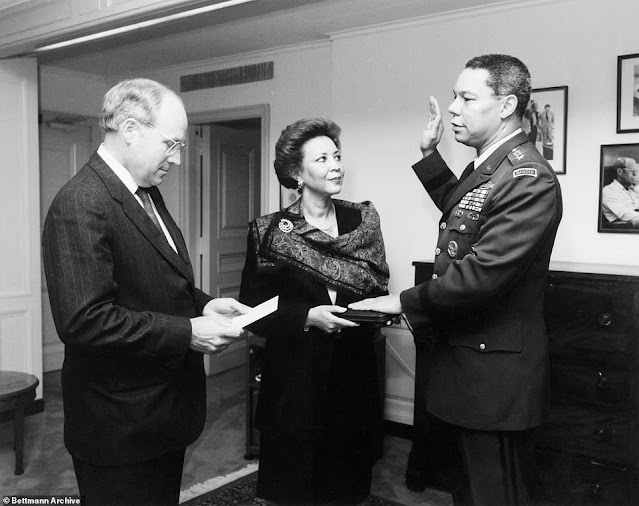The man
became an instant hero as he made his
presentation making the case for war with Iraq at the United Nations on
February 5, 2003.
He noted that Iraq harbored a terrorist network
headed by al-Qaeda operative Abu Musab al-Zarqawi (in a small region controlled
by Ansar al-Islam). He also claimed that Iraqis visited Osama bin Laden in
Afghanistan and provided training to al-Qaeda members. As much criticism as Powell received for this
— he’s called it “painful” and something that will “always be a part of my
record” — it hasn’t been close to what’s justified. The man who was secretary of state under President George
W. Bush, was much more than just horribly mistaken: He fabricated “evidence”
and ignored repeated warnings that what he was saying was false.
Unfortunately,
Congress never investigated his use of the intelligence he was given, so public
did not know many of the specifics. Even
so, what did reach the public record in other ways is extremely damning. My colleagues, every statement I make today is
backed up by sources, solid sources. These are not assertions. What we’re
giving you are facts and conclusions based on solid intelligence.
Colin
Powell, the son of Jamaican immigrants who became a US war hero and the first
Black secretary of state but saw his legacy tarnished when he made the case for
war in Iraq in 2003, died today of Covid-19 complications. He was 84. The
retired four-star general and former head of the Joint Chiefs of Staff who
served four presidents made his reputation as a man of honor distant from the
political fray -- an asset in the corridors of power.
"General
Powell is an American hero, an American example, and a great American
story," George W. Bush said as he announced Powell's nomination as
secretary of state in 2000. In December 1989, Bush ordered Gen Colin Powell, then
chairman of the joint chiefs of staff, to launch Operation Just Cause, sending
26,000 invasion troops into Panama in a rehearsal of the Powell “doctrine of
overwhelming force” that was next employed two years later in the first Gulf
war. "In directness of speech, his towering integrity, his deep
respect for our democracy, and his soldier's sense of duty and honor, Colin
Powell demonstrates ... qualities that will make him a great representative of
all the people of this country."
His infamous February 2003 speech to the United Nations Security Council
about the alleged existence of weapons of mass destruction in Iraq -- the
evidence he presented was later proven to be false and remained a blot.
Born April 5, 1937
in Harlem, Powell's "American Journey" -- the title of his
autobiography -- started in New York, where he grew up and earned a degree in
geology. Along with earning his degree
Powell graduated college in 1958 as a second lieutenant in the US Army. That led to a 35-year career in the Army,
including leading the Joint Chiefs of Staff under George H.W. Bush and Bill
Clinton. While stationed at Fort Devens,
Massachusetts, Powell met his wife Alma Johnson. They married in 1962 and went
on to have two daughters and a son.
Powell's overseas
service began in Vietnam that same year, where he was sent by John F. Kennedy
to train South Vietnamese forces. He
was injured soon after in 1963 when he stepped on a booby trapped stake while
on patrol, earning a Purple Heart award. Powell went back to Vietnam in 1968
for a second tour, where he famously escaped a helicopter crash and returned to
the burning wreckage multiple times to rescue his fellow soldiers. 'With
complete disregard for his own safety and while injured himself, Major Powell
returned several times to the smoldering aircraft which was in danger of
bursting into flames,' his subsequent Soldier's Medal commendation read.
Upon his return
Powell worked toward a Masters of Business Administration at George Washington
University. From there Powell embarked
on a career in government service when he earned a prestigious White House
Fellowship under the Nixon administration in 1972. Ronald Reagan appointed him
his national security adviser in 1987. His Army service culminated in George H.W.
Bush naming Powell as the first black person to serve as Chairman of the Joint
Chiefs of Staff in 1989, where he was confirmed unanimously.
Powell's first big
test came soon after he took office when the Gulf War began in 1990. As the
nation's highest-ranking military adviser he guided US forces through Operation
Desert Storm. The US's successful Middle East campaign had then received rare
public praise for the government's handling of a conflict and earned Powell a
parade in his hometown of New York. He
stayed on the job for most of Bill Clinton's first year in office but clashed
with Clinton officials on a number of social and strategic military fronts.
For many Americans,
he was the public face of the 1991 Gulf War against Iraq. Powell was initially
lukewarm about going into the country, but his reputation soared in the
aftermath of the blitzkrieg that ejected Saddam Hussein's forces from Kuwait. For
a while, he even considered a run for the presidency.
Colin Powell, the
first black Secretary of State who formulated foreign policy under several
presidents, died Monday morning at the age of 84 of complications from COVID.
With regards – S.
Sampathkumar
18th Oct 2021.


No comments:
Post a Comment